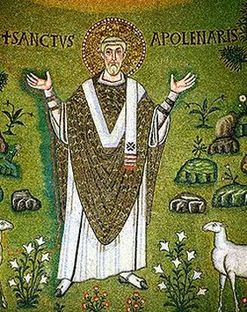
We find him then journeying in the Roman province of Aemilia [in Italy]. A third time he returned to Ravenna. Again he was captured, hacked with knives, had scalding water poured over his wounds, was beaten in the mouth with stones because he persisted in preaching, and was flung into a horrible dungeon, loaded with chains, to starve to death; but after four days he was put on board a ship and sent to Greece. There the same course of preachings, miracles and sufferings continued; and when his very presence caused the oracles to be silent, he was, after a cruel beating, sent back to Italy. All this continued for three years, and a fourth time he returned to Ravenna. By this time Vespasian was Emperor, and he, in answer to the complaints of the pagans, issued a decree of banishment against the Christians. Apollinaris was kept concealed for some time, but as he was passing out of the gates of the city, was set upon and savagely beaten, probably at Classis, a suburb, but he lived for seven days, foretelling meantime that the persecutions would increase, but that the Church would ultimately triumph. It is not certain what was his native place, though it was probably Antioch. Nor is it sure that he was one of the seventy-two disciples of Christ, as has been suggested. The precise date of his consecration cannot be ascertained, but he was Bishop of Ravenna for twenty-six years.
A noted miracle worker, Saint Apollinaris is considered especially effective against gout and epilepsy. His relics are at the Basilica of Sant'Apollinare Nuovo (which housed his relics from the 9th century until the 1748 reconsecration of Sant'Apollinare in Classe) and the 6th century Benedictine Basilica of Sant'Apollinare in Classe (on the traditional site of his martyrdom), both in Ravenna and in Saint Lambert's church, Düsseldorf, Germany. There are also churches dedicated to him in Aachen, Burtscheid and Remagen in Germany, where his veneration was probably spread by Benedictine monks. The Frankish king Clovis built a church dedicated to him in Dijon, and another dedicated to Saint Apollinaris also existed in Bologna, but was destroyed in 1250. Bořivoj II, Duke of Bohemia, founded a church with a collegiate chapter dedicated to Saint Apollinaris in Sadská (then an important centre of the Czech state) in 1117/1118. On behalf of Charles IV, Holy Roman Emperor, the chapter was later transferred from Sadská to recently founded New Town of Prague in 1362 and another church of St Apollinaris built there. Both of these churches in Bohemia stand to the present time.
In the Tridentine Calendar his feast day is July 23, his birthday into Heaven (i.e., the day of his martyrdom).




